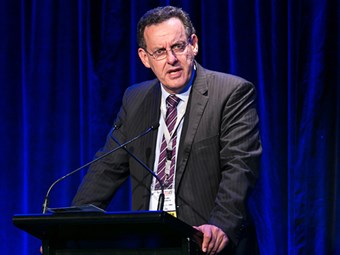Changing time forced terminal operators to act says Qube boss
The head of stevedore Patrick’s parent company has made an unapologetic presentation emphasising that port container access charges are here to stay and will rise at stevedore’s discretion until it is counterproductive to continue.
In a rare intervention from the stevedores’ side, Qube MD Maurice James insisted at an event last month for the Australian chapter of the International Cargo Handling Coordination Association (ICHCA) that Patrick was forced to act due to an operating environment that had changed out of previous recognition.
James argues that charging port haulage firms to access containers was the function of a "rebalancing" between stevedoring landside charges and shipping line charges.
"Market changes have led to previous arrangements being unsustainable," his presentation says.
"The stevedores had to act and they did."
At a time when soaring access charges and rising complaints from container trucking, exporters and cargo services has gained state political attention, James rejects any form of government intervention.
He reveals that Patrick provided the Victorian government’s port pricing and access review with "independent economic analysis" from Synergies Economic Consulting that concluded that there is "no persuasive case for regulatory intervention" and attempting to regulate will bring "significant risks and costs".
Despite the ACCC acknowledging there being no market between stevedores and port haulage firms, James insists: "The market should be left to sort it out and I’m confident that the right balance will eventuate."
This confidence is based on there being "serious overcapacity through fierce stevedoring competition", that the Australian Competition and Consumer Commission (ACCC) reviews the industry annually through both the Waterline and Stevedoring Monitoring reports, and the threat of State intervention if stevedoring profitability is excessive is a sufficient deterrent.
The presentation took the opportunity to address what James suggests are the arguments of the stevedores’ critics:
- shippers are paying twice – They shouldn’t be and if they are than they should be negotiating down the shipping line terminal handling charges
- no landside improvement – Conveniently forgets the investment by stevedores and landside performance improvement over many years. Truck turnaround times in Melbourne fell from 34.6 minutes in September quarter 2015 to 26.1 minutes in June quarter 2018
- landside should be regulated like PBLIS – My advice "be careful; what you wish for". PBLIS is not efficient and carriers pay significantly more in Sydney than Melbourne
- no transparency on shipping line terminal handling charges – the ACCC monitors stevedores and publishes annual reports which gives full transparency
- where will the charges end – the market will find a balance and State Governments can and should intervene if stevedoring returns become excessive
- stevedores should charge the shipping lines – yet carrier lobby groups are still demanding contractual relationships with stevedores and improved landside performance – the shippers are their customers. The carriers can’t have it both ways! Motor vehicle and break bulk cargo pays landside charges so why not containers?
- mechanism of recovery via transport operators are unfair – carriers add margins to recover additional costs and have had plenty of time to adjust customer contracts to pass this charge through. What’s the difference between a pass through to a transport company or a shipping line? Its more direct in each port to the carrier
- should regulate a prescribed fee – it’s a market and pricing should be linked to performance but carriers have never pursued it – why? Be careful what you wish for.
James then lobs the suggestion that maybe Patrick should charge the shippers directly.
After giving the longer-term critics short shrift, James turns his sights on state governments, observing that since the port privatisation over the past decade, they have lost expertise and knowledge of port and port logistics and no longer have port authority chairs and executives to provide advice
Attempts to create government freight bodies, such as Freight Victoria, have been unsuccessful.
James argues for a new forum for exchange of information with industry executives.
Government reform is also seen as particularly in rail freight.
Despite promises to ease congestion and in ways that take trucks off the roads, there are "too many self-interested roadblocks to new investment and services".
He notes that, in Victoria, it took Qube 18 months to get all approvals needed for a new terminal in Dandenong and call for the sort of policy certainty that allows private sector needs to make much-needed investment.
